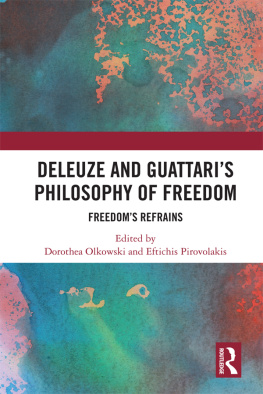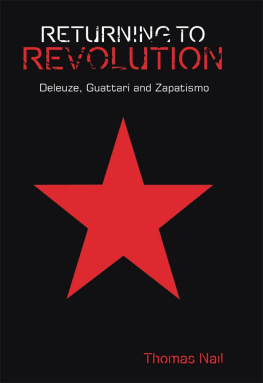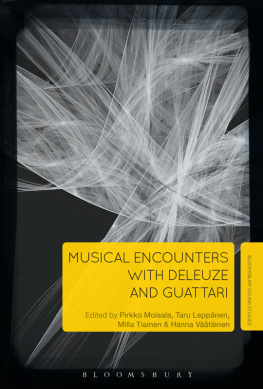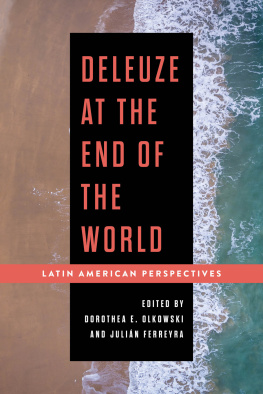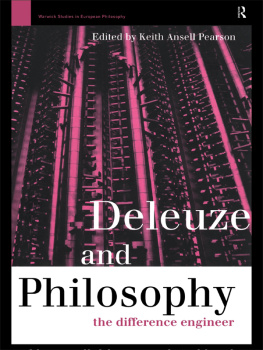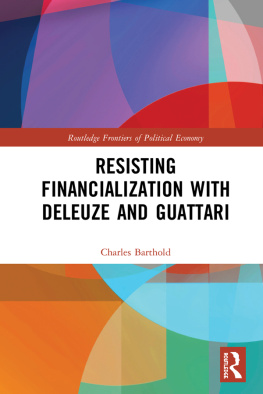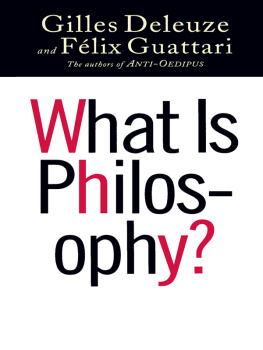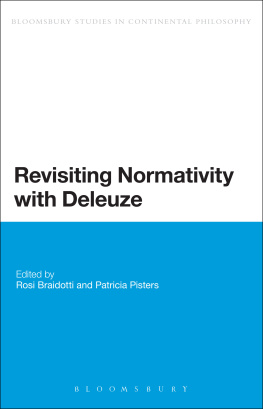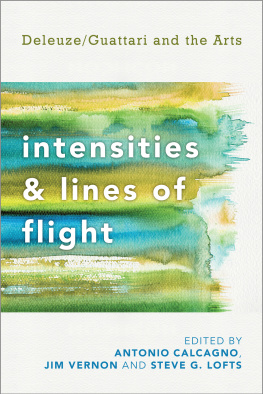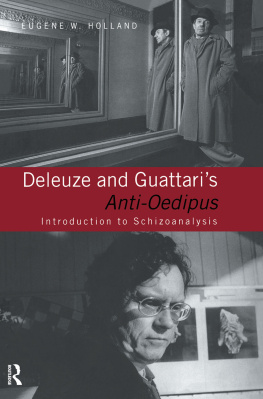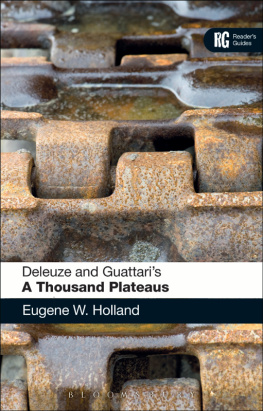Deleuze and Guattaris Philosophy of Freedom
This is a highly innovative and provocative engagement with Deleuzes thought that opens up new possibilities of thinking not only about the idea of freedom but also life in a political community.
Andreja Zevnik, University of Manchester, UK
This outstanding collection sheds new light on key Deleuzean concepts and on the concepts of freedom implicit in the work with Guattari. It includes new work by several leading Deleuze scholars that significantly advances the understanding and development of Deleuzean philosophy.
Paul Patton, University of New South Wales, Australia
This volume addresses the issue of freedom in the philosophy of Deleuze and Guattari. This is all the more challenging in that Deleuze-Guattari almost never use the term freedom, preferring instead the concept of the refrain. The essays collected in the volume show that freedom has been understood in a remarkably narrow sense and that in fact freedom operates as the refrain in every realm of thought and creation. The motivating approach in these essays is Deleuze-Guattaris emphasis on the irreality of media and capitalistic sign regimes, which they perceive to have taken over even the practices of philosophy, the arts, and science. By offering a clear and engaging treatment of the underexplored issue of freedom, this volume moves the discussion of Deleuze-Guattaris philosophy forward in ways that will appeal to researchers in continental philosophy and a wide range of other disciplines.
Dorothea Olkowski is Professor and former Chair of Philosophy, Director of Humanities, and Director of Cognitive Studies at the University of Colorado, Colorado Springs, USA. She is the author or editor of ten books including Postmodern Philosophy and the Scientific Turn (2012), The Universal (In the Realm of the Sensible) (2007), and Gilles Deleuze and the Ruin of Representation (1999).
Eftichis Pirovolakis is Assistant Professor of Philosophy at the University of the Peloponnese, Greece. He works on twentieth-century continental philosophy and, more specifically, on the relation between phenomenology, hermeneutics, and deconstruction. Pirovolakis has published articles in, among other journals, Philosophy Today, Word and Text, and Literature, Interpretation, Theory. He is the author of Reading Derrida and Ricoeur: Improbable Encounters between Deconstruction and Hermeneutics (2010).
Deleuze and Guattaris Philosophy of Freedom
Freedoms Refrains
Edited by Dorothea Olkowski
and Eftichis Pirovolakis
With translations by Constantin
Boundas and Andrew Goffey

First published 2019
by Routledge
52 Vanderbilt Avenue, New York, NY 10017
and by Routledge
2 Park Square, Milton Park, Abingdon, Oxon OX14 4RN
Routledge is an imprint of the Taylor & Francis Group, an informa business
2019 Taylor & Francis
The right of the editors to be identified as the authors of the editorial material, and of the authors for their individual chapters, has been asserted in accordance with sections 77 and 78 of the Copyright, Designs and Patents Act 1988.
All rights reserved. No part of this book may be reprinted or reproduced or utilised in any form or by any electronic, mechanical, or other means, now known or hereafter invented, including photocopying and recording, or in any information storage or retrieval system, without permission in writing from the publishers.
Trademark notice: Product or corporate names may be trademarks or registered trademarks, and are used only for identification and explanation without intent to infringe.
Library of Congress Cataloging-in-Publication Data
A catalog record for this book has been requested
ISBN: 978-0-367-07750-1 (hbk)
ISBN: 978-0-429-02256-2 (ebk)
Typeset in Sabon
by Apex CoVantage, LLC
Contents
DOROTHEA OLKOWSKI
CONSTANTIN BOUNDAS
Part I
Infinite Speeds and the Machine
JEAN-CLET MARTIN
MICHAEL J. ARDOLINE
Part II
Philosophy and Language
DOROTHEA OLKOWSKI
DANIEL W. SMITH
GREGG LAMBERT
Part III
Beyond Politics
CATARINA POMBO NABAIS
SOTIRIA-ISMINI GOUNARI
EUGENE W. HOLLAND
MOHAMED MOULFI
Part IV
Art and Creation
PHILIPPE MENGUE
PASCALE CRITON
Part V
Deleuze and Others
ALAN D. SCHRIFT
ALAIN BEAULIEU
CORRY SHORES
Dorothea Olkowski
The Refrain
If we inquire into the concept of freedom in the philosophy of Gilles Deleuze and that of Deleuze and Flix Guattari together, we may come up close to empty handed, for as scholars have noted, it is a term that Deleuze and Guattari seldom refer to and, even then, only in a tangential manner. Still, we are strongly inclined to speak of freedom in conjunction with their philosophy, and we want to know more about what motivates the philosophers contributing to this volume to celebrate the philosophy of Deleuze and Deleuze-Guattari as a philosophy of freedom. What indications do we have from them that freedom is a concept at stake in their work? It is certainly not a new concept, not newly created by Deleuze or Deleuze-Guattari, nor by any of the philosophers whose work has become associated with theirs. And yet, we cannot let go of the idea that Deleuze and Guattaris philosophy amplifies what we have called freedoms refrains. In saying this, we notice how easily we have bypassed the concept of the refrain in order to focus on the traditional concept of freedom. As it turns out, it is only by reversing course and returning to the refrain that we discover that the refrain has taken over the role, the activity, and the idea usually attributed to the concept of freedom, and that the refrain has taken over so thoroughly that we must revise all of our ideas about so-called freedom: what it is, how it functions, and what it produces.
Writing of the refrain, Deleuze and Guattari initially focus on how the refrain begins with chaos, the physical concept of random disorder that is also the basis of their conception of virtual chaosthe flows of desire, the body without organsfollowed by the beginnings of order in that chaos, a calm and stabilizing force emerging at the heart of chaos.
A child hums to summon the strength for the schoolwork she has to hand in. A housewife sings to herself, or listens to the radio, as she marshals the antichaos forces of her work. For sublime deeds like the foundation of a city or the fabrication of a golem, one draws a circle, or better yet walks in a circle as in a childrens dance combining rhythmic vowels and consonants that correspond to the interior forces of creation as to the differentiated parts of an organism.
This song and dancecharacterized by Deleuze and Guattari as drawn from earthly or terrestrial forces and not as those of a subjectmust be engaged in precisely the right way, since any mistake in the speed, rhythm, or harmony would be catastrophic; it would interrupt the order entered into by the creator, unmake the creation, and return both to the chaos. Why is this? What freedom can there possibly be in all of this ordering and organizing? It appears that, in the refrain, the periodic repetition through rhythmic association with earthly forces operates like an open thermodynamic system, and so creates strength and marshals forces, but it does so by producing difference.

